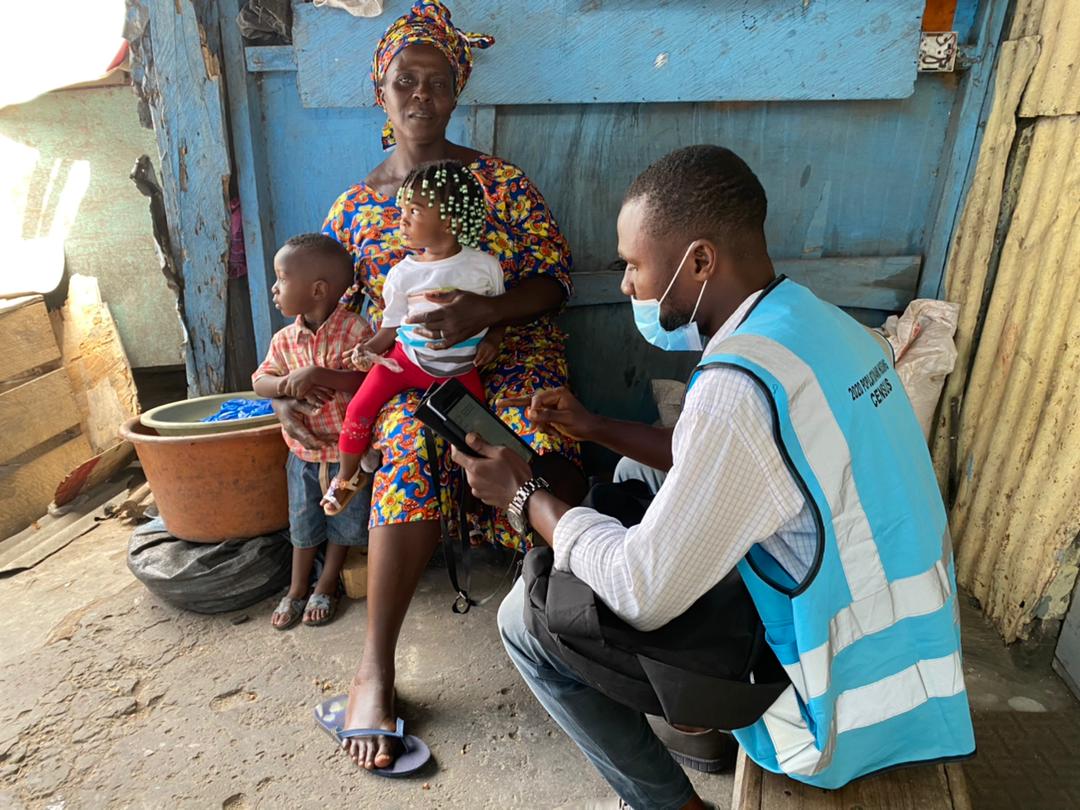The United Nations Population Fund (UNFPA) has given immense support to the 2021 Population and Housing Census (PHC) process currently underway in Ghana. UNFPA in collaboration with the Ghana Statistical Service (GSS) deployed about 40 international independent monitors from different countries to observe and report on the data collection and field operations in the ongoing exercise.
UNFPA Resident Representative, Mr. Niyi Ojuolape the UNFPA Chief Technical Advisor Dr. Collins Opiyo joined a team of enumerators to monitor the exercise in the Korle Klottey Municipal Assembly in the Greater Accra Region.
The purpose of the monitoring exercise is to ensure it meets international standards, document best practices, and share lessons learned with other countries to support their own census processes.
Mr. Ojuolape said since this is the first time of using digital modality of collecting data, mechanisms have been put in place to resolve issues that arise. The process involves a chain of IT solutions when challenges are encountered by the enumeration teams in the field. They are reported to the technical teams who are situated in the District census offices for ratification. If the issue is not resolved at the district level, it is transferred to the regional level and subsequently to the HQ if it is beyond the region.
In his words, Mr Ojuolape said “A perfect census will benefit the population. It provides relevant data about the people which helps government to respond to the needs as appropriate.”
Population and housing censuses are a principal means of collecting basic population and housing data which serves as a source of statistical information for economic, social development planning and informs policies implemented to address the needs of the citizens.
UNFPA Chief Technical Advisor to the GSS for the 2021 PHC, Dr. Collins Opiyo indicated that census is a serious business and takes effective partnership to be successful. With about 51,935 enumeration areas, the digital census involves the use of tablets to capture data and ensure that every household is captured through the availability of an interactive map.”
Dr. Opiyo mentioned that Ghana’s use of technology and new methodologies for the 2021 PHC is a requirement by the United Nations Principles and Recommendations for Population and Housing Censuses. “It took 3 to 4 years to prepare for this census. We are working together with government to resolve all the shortcomings and to ensure that the census activity is completed by July 11” Dr. Opiyo concluded.
Every district has a team of 4 people; the District Officer, Data Monitor Officer, District IT Support, and District Field Supervisor to ensure the coordination of activities in the enumeration areas in the various districts.
Narrating his experience from the field, Mr. David Nii Kotey, a Field Officer in the Korle Klottey Municipal Assembly said his main challenge is with interviewees when administering the questionnaires. “You have to speak the local language of the people to enable you to earn their trust for them to disclose vital information” David stated.
Mr. David Nii Kotey said most of the people within his enumeration areas are mostly not available within the day. So his work is more effective in the evenings. “This is challenging due to the loads of questions for individuals in each household”- he lamented.
However, he expressed satisfaction with the training organised by GSS with support from UNFPA Ghana for all enumerators to ensure positive results.
Ghana’s 2021 PHC commenced on June 28 and scheduled to end on 11 July 2021.


